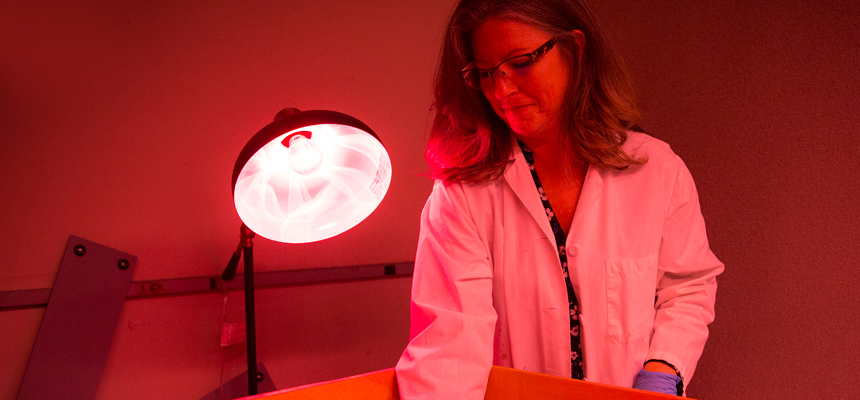Research Appreciation Day
By Jan Jarvis

The first year Brina Snyder presented a poster for Research Appreciation Day she was nervous about what to expect.
Three years and three RADs later, Snyder has learned a thing or two.
“You have to practice,” she said, “The more you say it, the better you say it and the easier it comes to mind.”
Snyder will join students and faculty members who will present 249 posters or give nine oral presentations during Research Appreciation Day this Friday on the third floor of the Gibson D. Lewis Library.
For Snyder, who will graduate in May with a PhD in Pharmacology and Neuroscience, this will be her last RAD and she’s hoping to win.
The poster that’s on her laptop will soon be transferred to a board that focuses on how testosterone metabolites can be either protective or damaging. Over the last four years, she found the work with testosterone under the guidance of mentor Rebecca Cunningham, PhD, fascinating.
“I think testosterone is a major player in the onset of Alzheimer’s disease,” she said. “Knowing when it is protective and when it is damaging is important to improving therapeutics in the future.
Snyder has been collecting data from studies on rats to explore the relationship between testosterone and sleep apnea.
“Twenty-five present of the population has sleep apnea but 80 percent are not diagnosed,” she said. “That’s a huge group that may be prescribed testosterone without realizing they have an underlying condition affecting it.”
Presenting at RAD each year has helped Snyder and hundreds of other students fine-tune their presentation skills and learn the nitty-gritty of posters from the font used on the board to the material it is printed on. Fabric for example, can be packed up and used at out-of-town conferences.
“RAD really helps you learn how to present science to the public in a way that is understandable,” Snyder said. “You learn to take the data you have collected over time and put it together in a way that is a cohesive story.”
The skills learned at RAD are easily applicable to one’s career, Snyder said.
“It’s good practice for what you’re going to do when you leave the academic world,” she said.
Students and faculty also benefit from hearing from outstanding speakers each year, from a Nobel Prize winner to a former U.S. Surgeon General.
This year Dr. Patricia Flatley Brennan, Director, National Library of Medicine, will speak at noon in the Medical Education and Training Building. Dr. Brennan is a pioneer in the development of information systems designed to increase patients’ independence. She will discuss how librarians will play a key role in a future of data-driven research and data-powered health.
“I am looking forward to a lively day of discussion with health professionals and library science trainees and faculty exploring how to best foster the transformation of data into health,” she said.
A panel of judges will select the top presentation in each category and prizes totaling $15,150 will be awarded during a ceremony at 1:15 p.m.
Keynote speakerDr. Patricia Flatley Brennan, Director, National Library of Medicine, will speak at noon in the Medical Education and Training Building. Dr. Brennan is a pioneer in the development of information systems designed to increase patients’ independence. She will discuss how librarians will play a key role in a future of data-driven research and data-powered health Keynote addressApril 6, 12:00 p.m. |






Social media